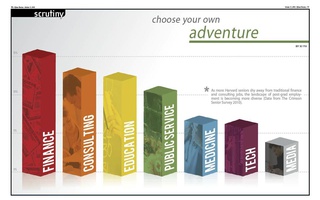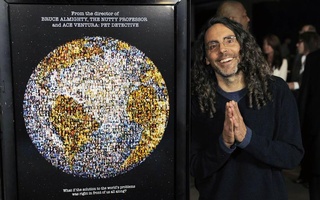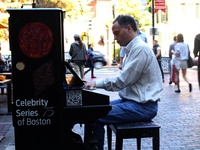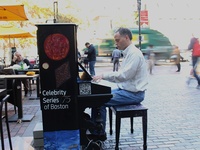
Stephen Leroy, Harvard researcher, enjoys playing the piano in front of Au Bon Pain last Friday afternoon. Leroy is one of the many who have shared their music abilities on the pianos throughout Cambridge.
It’s not every day that you find a sign inviting strangers to free piano lessons in a city square, but on Saturday, passers-by in Harvard Square were treated to this rare musical experience. The Harvard College Piano Society, a group of students that aims to promote musical culture and provide piano instruction and performance, offered free piano lessons to the public at four pianos located in and around Harvard Square for three hours on Saturday afternoon.
The Society hosted lessons at three focus pianos—located in front of the Holyoke Center, at Brattle Plaza, and at 27 Garden Street—from among those placed in public spaces by “Play Me, I’m Yours,” a worldwide art project that aims to give people in urban areas access to pianos. A fourth piano, located at the Science Center Plaza, was originally intended to be used but was locked on the day of the event.
Allen L. Yuan ’15 was the first teacher stationed at the Holyoke piano, which was set out for anyone to play, students, children, and adults alike. Yuan says he is passionate about teaching. During his lessons, he taught a college-aged student the C major scale. She may have been a novice, but by the end of her street lesson, she played the scale fluently—finger crossovers included. Yuan says that teaching piano is symbiotic and hopes the Piano Society’s event will spread music throughout the community. “Teaching feels really good, to get someone to understand and see a student who is happy to learn,” Yuan says.
At Brattle Plaza, it was hard to miss the huddle of piano players in the midst of passing cars and pedestrians. Yuan hopes that the Piano Society will spread music throughout the community, and by the looks of it, his wish has already come true, as this piano was being used by five people at once.
Tania Rivers-Moore ’15 is recital and projects chair of the Piano Society and, like Yuan, says she enjoys teaching. “The most exciting part of teaching is getting inside the mind of someone else and imagining yourself as a novice, seeing what motivates them,” she says. Rivers-Moore says there is a wide range of students—from children who know the basics of piano to adults who have never touched a keyboard. Her favorite part of the job is seeing the adults, who often initially assume they’re too old to learn piano and are too bashful to try, brave the lesson and puzzle out a song.
The Harvard College Piano Society, which has been in existence since 2000, was revived by a new leadership last year and has since garnered some impressive accomplishments—last year, the Society played at Carnegie Hall under a Steinway sponsorship. The Society continues to collect students that are willing to teach for modest wages.Later this semester, the Society will host a tech workshop about the workings of a piano, and the group plans to host several concerts.
At Brattle Plaza, the people clustering around the piano were enthusiastic, with one member of the crowd drumming on the piano and another four flying up and down the keys. They conferred with one another which song to play next. Cherie Z. Hu ’17 offered “Hey Jude” as the final suggestion. Everyone cheered in accord. Hu sat down and began playing the beloved Beatles song effortlessly. Matthew Wu ’17 pulled out the lyrics on his phone. Soon enough, everybody began singing along and the crowd, many of whom didn’t know each other, joined together and orchestrated a song off-the-cuff.
Read more in Arts
'Instructions Not Included' Builds American AudienceRecommended Articles
-
The China SyndromeDespite China’s willingness to game the currency market, long-term global prosperity still rests on our ability to fully integrate China into the world economy.
-
 Love @ctually?
Love @ctually? -
 Working the Degree
Working the Degree -
Extreme NetworkingThis November, Lawrence S. Cripe ’13 has class only three to four days a week. The reason isn’t because he’s ...
-
 Director of 'Bruce Almighty' To Speak About New Film
Director of 'Bruce Almighty' To Speak About New Film -
Depressed Yuan, Equivocal YawnChina buys U.S. assets, and then sends the U.S. more and more manufactured products—all in exchange for the precious opportunity to spend long hours making those products, dump the revenue back into U.S. assets to depress the exchange rate, rinse, and repeat.















